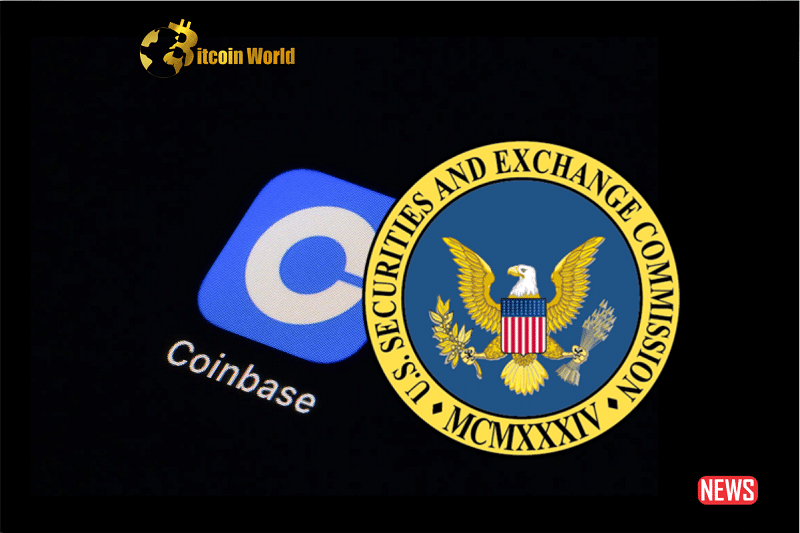The ongoing saga between the cryptocurrency industry and U.S. regulators took another intriguing turn recently. Coinbase, a major player in the crypto exchange world, has been actively pushing for clearer regulatory guidelines. Their latest move? A formal petition to the Securities and Exchange Commission (SEC) demanding more transparent rules for the digital asset landscape. But the SEC’s response, revealed in recent court filings, suggests the path to clarity might be longer and more complicated than many hoped.
The SEC’s Stance: No Rush on Crypto Rules?
So, what exactly did the SEC say? In a nutshell, they indicated that comprehensive rulemaking for the cryptocurrency sector could be a multi-year endeavor. This means that, for the foreseeable future, enforcement actions will remain the primary way the SEC interacts with the industry. Documents filed on May 15th highlight the SEC’s argument that they aren’t legally bound to fulfill every request outlined in Coinbase’s petition. They also suggest that Coinbase’s desire for swift and sweeping regulatory reforms simply isn’t feasible given the current circumstances.
The SEC is even seeking to deny Coinbase’s petition for a writ of mandamus – a court order compelling a government agency to act. The regulator argues that this is an “extraordinary remedy” and that Coinbase hasn’t proven they have a clear right to such relief. This back-and-forth underscores the tension between the industry’s need for clear rules and the regulator’s approach to oversight.
Coinbase’s Perspective: Seeking Clarity in a Murky Landscape
Coinbase isn’t backing down. Their Chief Legal Officer, Paul Grewal, took to Twitter to share his thoughts on the SEC’s filing. He pointed out that this might be the first time the SEC has formally articulated its position on establishing crypto regulations. While acknowledging this development, Grewal emphasized the continued need for more detailed guidance on a range of issues.
“The SEC told the court that rulemaking could take a significant amount of time, and they’re not in a hurry,” Grewal stated. He further explained that the SEC seems to view enforcement actions as a temporary measure, potentially informing future rulemaking initiatives – whenever those might be planned. This raises a key question: Is regulation by enforcement the best approach for a rapidly evolving industry like crypto?
A Tale of Two Statements: Gensler’s Words vs. the SEC’s Filing
Adding another layer of complexity, SEC Chairman Gary Gensler delivered a speech just hours before the filing, asserting that sufficient rules for the crypto industry are already in place. However, the SEC’s official filing seems to distance itself from these public comments.
Grewal highlighted this discrepancy, noting, “The SEC stated that Chair Gensler’s public statements don’t represent formal guidance or policy statements from the SEC, and the public shouldn’t rely on them as such.” This creates a confusing situation for crypto businesses trying to navigate the regulatory environment. If the chair’s pronouncements aren’t official guidance, where should the industry look for clarity?
Key Takeaways from the SEC’s Response:
- Rulemaking is a Long Game: The SEC doesn’t foresee comprehensive crypto regulations appearing anytime soon.
- Enforcement Continues: Expect the SEC to maintain its current approach of regulating through enforcement actions.
- No Obligation to Rule: The SEC argues it’s not legally required to create the specific regulations Coinbase is requesting.
- Gensler’s Words Not Official Policy: Public statements from the SEC Chair might not reflect the agency’s formal stance.
Why the SEC is Pushing Back:
The SEC argues it shouldn’t be forced into rulemaking, stating that neither securities laws nor the Administrative Procedure Act mandate extensive new regulations for “digital assets” as requested by Coinbase. They also point to the complexity of the various proposals put forth by Coinbase. Despite this, it’s worth noting the timeline: Coinbase filed its initial petition less than ten months ago, with subsequent additions. This begs the question: Is the SEC’s timeline for considering these matters reasonable given the industry’s pace of innovation?
Coinbase’s Concerns: A Lack of Clarity Persists
The SEC also argues that Coinbase hasn’t demonstrated significant harm resulting from the delay in addressing their petition. Furthermore, the SEC contends that its recent enforcement actions in the crypto space don’t indicate a decision against future rulemaking. They maintain that they are reviewing Coinbase’s petition as part of their normal process.
However, Grewal counters this, stating, “Overall, the SEC’s response reinforces Coinbase’s longstanding concern that our industry lacks clarity regarding the SEC’s jurisdiction, and that their stance is prone to change along the way.” This highlights a fundamental challenge for crypto businesses: operating in an environment where the regulatory landscape is uncertain and potentially shifting.
What Does This Mean for the Crypto Industry?
The SEC’s response suggests that the path to clear and comprehensive crypto regulations in the U.S. will likely be a protracted one. For businesses in the space, this means continued uncertainty and the need to navigate a complex legal environment. While enforcement actions will likely continue, the industry’s call for transparent rules remains a central point of contention. The back-and-forth between Coinbase and the SEC underscores the ongoing debate about how best to regulate this innovative yet still nascent industry.
Ultimately, the question of when and how comprehensive crypto regulations will materialize in the U.S. remains unanswered. The SEC’s recent filing offers a glimpse into their current thinking, but it also highlights the significant challenges and disagreements that still need to be addressed before a clear path forward emerges.
Disclaimer: The information provided is not trading advice, Bitcoinworld.co.in holds no liability for any investments made based on the information provided on this page. We strongly recommend independent research and/or consultation with a qualified professional before making any investment decisions.


